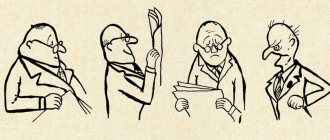Character (from the Greek charakter - seal, embossing, distinctive feature, sign, omen, peculiarity. The concept of “character” means the totality of individual mental properties that develop in activity and are manifested in methods of activity and forms of behavior typical for a given person.
Character is an individual combination of stable mental characteristics of a person that determine a typical way of behavior for a given subject in certain life conditions and circumstances.
Character is an established system of stable mental characteristics that express a person’s different attitudes towards reality and himself.
Character is a set of stable personality traits that determine a person’s attitude towards people and the work they do. Character is manifested in activity and communication (like temperament) and includes what gives a person’s behavior a specific, characteristic shade (hence the name “character”).
Character expresses the most typical essential features of a person, knowledge of which allows one to predict how a person will act in certain situations.
Character reveals dependence on worldview, beliefs and moral principles, revealing its socio-historical nature.
What is character?
Character is a system of relatively constant mental properties that determine the behavior of an individual and the main features of his interaction with the outside world. Character is formed and developed throughout life. It includes many personal qualities, patterns of behavior and habits that are formed under the influence of external and internal factors.
The term "character" is derived from the ancient Greek word χαρακτήρ (read as "character"), which is translated as "special mark", "distinctive feature" or "sign".
The character has two key features:
- character traits are stable if we take into account a short period of time, but they change with the accumulation of knowledge and life experience;
- character determines a person’s entire life, influencing most of his decisions, actions and statements.
The most typical personality traits are manifested in character. Thus, knowing well the character of a certain person, it is possible to predict his behavior in different situations and reaction to certain events with fairly high accuracy.
In psychology, an entire section is devoted to the study of character—characterology. She studies the essence of character and its types, as well as the processes of its formation and development.
Differences from temperament
People often confuse character and temperament. In the first case (character) these are the personal characteristics of any person and they are formed from the cradle, and the second (temperament) are the properties of the nervous system (NS), namely its responsiveness, mobility and stability. An important fact is that temperament is completely innate and cannot be changed. In simple words, temperament is the basis (foundation) on which character will be formed and developed in the future. Hippocrates classified temperament into four types:
How is character revealed?
Since character is a combination of a large number of relatively constant properties of the psyche, its manifestations are present in every action in all spheres of life. These manifestations, as a rule, are represented by extreme degrees of certain forms of behavior. Let us consider the manifestations of character in different areas in more detail.
In relation to yourself it could be:
- modesty and arrogance;
- shyness and vanity;
- self-criticism and self-confidence.
In relation to others:
- isolation and sociability;
- the desire to dominate and the desire to be part of a team;
- trust and distrust;
- hostility and friendliness.
In relation to work:
- hard work and laziness;
- responsibility and irresponsibility;
- good faith and bad faith.
In relation to material assets:
- generosity and greed;
- thrift and extravagance;
- neatness and sloppiness.
The ancient Greek philosopher Heraclitus once said, “Character determines destiny.” And this is really so, because it manifests itself in every everyday little thing, in every serious or small decision and in every phrase spoken to a close or not so close person.
Personality concept
Personality is a concept that reflects the social nature of a person, studying him as a subject, as a bearer of individual consciousness, and so on.
In the context of psychology, personality is an individual who acts both as a subject of relationships in society and as a subject in his own conscious activity.
Personality is also understood as a system of personality characteristics that manifests itself in human activity.
According to R. Cattell, personality is a concept that characterizes a person’s behavior in a specific situation. J. Allport believes that “personality is something, and it does something.”
Personality is what underlies certain actions of a person himself.”
How is character formed?
Erich Fromm wrote in one of his works: “The character of a child is a copy of the characters of his parents.” Thus, the main factors in character formation are genetic background and the personal influence of the child’s parents or guardians. In the future, the development of character is influenced by everyone with whom the person comes into contact: educators and classmates, friends and lovers, work colleagues and strangers with authority.
Throughout life, character is influenced by temperament, which determines a person’s reaction to current events (we will look at how temperament influences character below). Therefore, some people become sociable, responsible and decisive, while others lack these character traits.
Different character traits are formed at different periods of life:
- Primary features. This part of the character is formed in early childhood (usually from 2-3 to 7-9 years).
- Social traits. This part is formed mainly at school age - between 7 and 14 years. During this period, children learn the intricacies of social interaction through contact with relatives, classmates, friends and teachers.
- Strong-willed traits. The formation of will and discipline occurs between the ages of 14 and 18. In adolescence, a person is constantly faced with a choice between correct and desired actions, and is aware of the consequences and cost of decisions made.
- Basic features. This is an extensive group of character traits that form, develop and change throughout life. It includes curiosity, sociability, responsiveness, morality, the ability to compassion and other traits that determine a person’s interaction with society and the outside world.
By adulthood, character is usually formed and consolidated. After that, it continues to change, but much more slowly. This mainly occurs under the influence of factors such as:
- example from loved ones and simply significant people;
- other people's opinion, approval and condemnation;
- culture (literature, films and other works);
- moral standards, religion and ideology of society.
In recent years, the Internet has become one of the most important factors influencing the character of people of all age categories. On the Internet, people get acquainted with cultural works, watch videos and play games. But the main factor is still communication. Internet users get the opportunity to communicate with a large number of different people (including foreigners), participate in discussions, and join different communities.
It is believed that a modern person becomes a mature personality with a fully formed character around the age of 30. By this age, the basic character traits necessary to achieve professional success and start a family are consolidated. Of course, many people become successful and start families earlier. But at the age of 30, a person develops such fundamental traits as determination, discipline, responsibility and endurance.
Bibliography
1. Vygotsky L.S. Pedagogical psychology. – L., 1983.
2. Enikeev M.I. General and legal psychology (in two parts). Part I “General psychology”. Textbook. – M.: Legal. lit., 1996.
3. Kovalev A.G., Myasishchev V.N. Psychological characteristics of a person. T. 1. Character. – L., Leningrad State University Publishing House, 1958.
4. Brief psychological dictionary / Ed. A.V. Petrovsky and M.G. Yaroshevsky. – M., 1985.
5. Krutetsky V.A. Psychology. – M.: Education, 1986.
6. Levitov N.D. Psychology of character. 3rd ed. – M., Education, 1964.
7. Leongard K. Accentuated personalities. – Kyiv, 1981.
8. Leontyev A.N. Problems of mental development. – M., 1965.
9. Lichko A.E. Psychopathy and character accentuations in adolescents. – L., 1983.
10. Nemov R.S. Psychology. – M.: Education, 1990.
11. Nemov R.S. General psychology: Textbook. for students education institutions prof. education. – M., 2003.
12. General psychology: Textbook for students of pedagogy. Institute / A.V. Petrovsky, A.V. Brushlinsky, V.P. Zinchenko and others; Ed. A.V. Petrovsky. – M.: Education, 1986.
Attention!
If you need help writing a paper, we recommend turning to professionals. More than 70,000 authors are ready to help you right now. Free adjustments and improvements. Find out the cost of your work
Free estimate
+1
Size: 24.82K
Downloads: 114
11/18/14 at 05:17 pm Author: Portugal
Liked? Click on the button below. It's not difficult for you
, and we
are pleased
).
To download Abstracts for free at maximum speed, register or log in to the site.
Important! All presented Abstracts for free downloading are intended for drawing up a plan or basis for your own scientific works.
Friends! You have a unique opportunity to help students just like you! If our site helped you find the job you need, then you certainly understand how the job you add can make the work of others easier.
Add a job
If, in your opinion, the Abstract is of poor quality, or you have already seen this work, please let us know.
Character types
Despite the large number of classifications proposed by authoritative authors, there is no single generally accepted system yet. Psychology uses several fairly convenient classifications based on factors such as temperament, personality type, physiological characteristics of the body, etc. Let's look at the most interesting theories.
1. Classification by temperament
Not all people correctly understand what character is and how it differs from temperament, so these concepts are often confused. Their main difference is that temperament is inherent in a person by nature and is practically not subject to correction.
Character is formed over the course of life, but at the same time depends on temperament. This means that this can be used to divide into types. Taking Hippocrates' classification as a basis, we can highlight the main character traits characteristic of owners of different types of temperament:
- Choleric. People with this type of temperament are usually quick-tempered and impulsive, they tend to react emotionally and dramatize what is happening. As a rule, choleric people are very impatient, they are not distinguished by strong will and determination, therefore they are often weak-willed, despite their ostentatious determination.
- Sanguine. This type of temperament is characterized by mobility, a sense of humor, emotional stability and the ability to quickly respond to events. Sanguine people usually have a fairly strong-willed character, they are reasonable and consistent.
- Phlegmatic person. People with a phlegmatic type of temperament are calm in most situations, since they are weakly susceptible to emotions. Phlegmatic people are characterized by such character traits as balance, perseverance, perseverance and diligence. When communicating with others, they are usually calm and not prone to conflicts, as well as to any other manifestation of emotions.
- Melancholic. Such people are distinguished by impressionability and emotional lability. They are vulnerable and touchy, and experience failures very painfully. Failure can push a melancholic person into an impulsive act or force him to quit. Thus, a melancholic temperament is accompanied by a weak will and weak character.
Classification by K. Jung
Swiss psychiatrist Carl Jung proposed a simple, but at the same time quite comprehensive classification of personality types, including only three basic types:
- Extroverts. These are very emotional and open personalities who constantly need communication. They usually demonstrate a high level of responsibility towards other people, but are often irresponsible in matters relating to their own health and some other aspects of personal well-being.
- Introverts. Such individuals are usually immersed in the world of their own experiences and sensations. At the same time, they are often withdrawn and not particularly willing to contact others. They do not like to take responsibility, but given time they show themselves to be good analysts capable of producing high-quality results.
- Ambiverts. These are individuals who have individual traits of both previous types. They get along well with others, but often need to be alone with themselves. They are generally charismatic and witty, but often behave in a toxic manner. However, they get along well with others.
Kretschmer's character theory
German psychologist Ernst Kretschmer described 3 character types and compared each of them with certain physique and physiology features:
- Asthenics. These are people with a thin physique and not very naturally developed muscles. Asthenics have a schizothymic type of character, which implies stubbornness, isolation and poor ability to adapt to changing circumstances.
- Athletics. This type has a slender body with naturally developed muscles. The character of such people is calm, practical, authoritative, responsible and kind.
- Picnics. These are people with a heavy build, overweight and weak muscles. They are quite sociable and are able to quickly adapt to dramatically changing circumstances.











